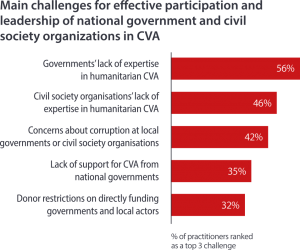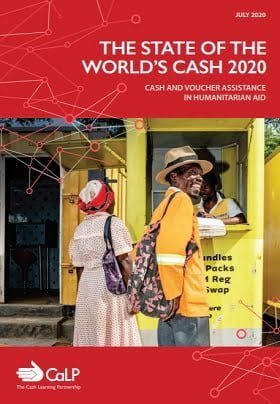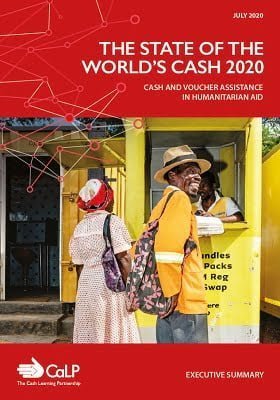State of the World’s Cash 2020 Chapter 7: CVA integration with local systems
MAIN FINDINGS
There is a growing consensus on the importance of localisation within CVA. But this broad agreement is yet to evolve into a common understanding of what localisation means in practice and which aspects to prioritise.

![]() Perceptions of the capacity of local organizations remain a barrier to change. Acknowledgement of the added value and strengths of local actors is needed, alongside greater investment in sustainable capacity development.
Perceptions of the capacity of local organizations remain a barrier to change. Acknowledgement of the added value and strengths of local actors is needed, alongside greater investment in sustainable capacity development.
![]() For rapid and effective response on a sustainable basis, the role of local actors and systems is critical. Making progress on localization requires humanitarian actors to be actively committed to shifting the balance of power. This means changing ways of working, developing equitable partnerships and adapting tools and systems to the context.
For rapid and effective response on a sustainable basis, the role of local actors and systems is critical. Making progress on localization requires humanitarian actors to be actively committed to shifting the balance of power. This means changing ways of working, developing equitable partnerships and adapting tools and systems to the context.
![]() Investments in sustainable local capacity should include strengthening cash readiness and promoting the use of local systems. This includes funding local organisations to plan and deliver CVA directly, rather than solely as implementing partners.
Investments in sustainable local capacity should include strengthening cash readiness and promoting the use of local systems. This includes funding local organisations to plan and deliver CVA directly, rather than solely as implementing partners.
![]() Effective CVA localisation entails a wide range of stakeholders, including smaller civil society organisations, and representatives from target communities, including aid recipients.
Effective CVA localisation entails a wide range of stakeholders, including smaller civil society organisations, and representatives from target communities, including aid recipients.
![]() The role of governments and local organisations in CVA coordination structures varies by country but, in most cases, participation remains minimal.
The role of governments and local organisations in CVA coordination structures varies by country but, in most cases, participation remains minimal.
PRIORITY ACTIONS
- All humanitarian actors should agree on clear, measurable and shared priorities for localisation of CVA, and commit to action.
- All humanitarian actors should recognize that progress on CVA localization will mean shifts in power, as well as changes to funding processes, systems and requirements to enable the systematic consideration and strengthening of local systems and structures.
- Donors should increase predictable funding to local structures and systems for CVA planning and delivery.
- All humanitarian actors should make changes to ensure the meaningful participation and visibility of local actors in CVA discourse at national, regional and international levels.
- Humanitarian actors should make changes to CVA coordination platforms to ensure effective participation and engagement of local stakeholders.
- Local stakeholders, international agencies and donors should build true alliances, including for strategic planning and decision-making.
Project leads
Further reading

The State of the World’s Cash 2020 – Full report
Report
Since the first State of the World’s Cash report we have seen huge developments in cash and voucher assistance (CVA), with a continued increase in scale driving changing roles and partnerships, and a growing emphasis on quality. This new report, State of the World’s Cash 2020, examines progress, changes, and challenges in the use of CVA within the rapidly shifting humanitarian landscape...

The State of the World’s Cash 2020 – Executive summary
Report
The State of the World’s Cash 2020 provides a comprehensive snapshot of cash and voucher assistance (CVA), with significant recommendations for anyone interested in humanitarian action. This report follows on from the first report, a seminal piece, published in 2018. Since then CVA has continued to grow and is now a major part of almost every humanitarian response. The total amount of CVA...



